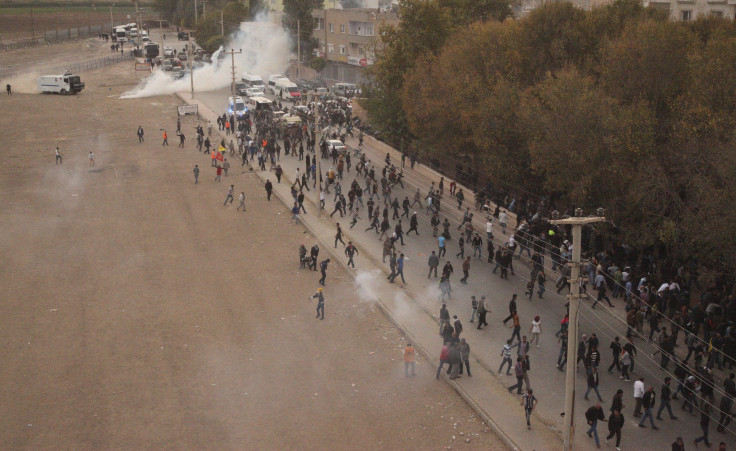Turkish Officials Wary Of Independent Iraqi Kurdistan Despite Economic Gains

ISTANBUL, Turkey — As Kurds inside Iraq exploit the chaos gripping the country to press for the establishment of an independent state, one key player is casting a wary glance at this development: the Turkish government, which has for decades used force to suppress a Kurdish independence movement in southeastern Turkey.
For the Turks, the prospect that an independent Iraqi Kurdistan might now be taking shape in northern Iraq, one financed by lucrative oil installations in the area of Kirkuk, raises the risk that Kurds on both sides of the border could unite, threatening Turkey's hold on a large portion of its territory.
For years, the Turkish government has opposed Kurdish ambitions both in Iraq and at home. Since the early 1990s, Kurdish people living in southeastern Turkey have struggled, sometime violently, for independence from the central government.
“Turkey would be strongly opposed to an Iraqi Kurdistan,” said Cenap Çakmak, an international relations expert at Eskişehir Osmangazi University's department of international relations. “The things that are going on in Iraq are working in favor of the Kurdish government. The Kurds are consolidating power and expanding the sphere of influence in the area and now they have better reason to raise the ambition of becoming independent. The Kurdish in Turkey have similar ambitions. It is a major threat to national security and national identity.”
If the Kurds in Iraq were to declare independence, he added, Kurdish communities in Turkey would “be inclined to be part of that country."
Osman Bahadir Dincer, a researcher from the International Strategic Research Organization in Istanbul, described such a scenario as one that would cause “chaos” in Turkish society.
“We have been suffering from the PKK problem almost 30 years,” he said referring to the clashes between the Turkish military and the Kurdish rebel group in the 1990s. “These people were responsible for killing thousands of people. And now they are talking about asking for autonomy.”
On the other hand, some experts in Turkey portray the emergence of an independent Iraqi Kurdistan as a potentially enormous economic opportunity. Instead of an amalgam of competing forces ruling northern Iraq and its vast oil stocks, the Kurds and their disciplined army would be in charge, fostering stability that would enable greater trade with Turkey.
“I think Kurds are one of the winners of the situation in Iraq because they are extending their territory. They have taken the Kirkuk without any struggle,” Dincer said. Kirkuk, formerly under the control of the Iraqi military, is now in the hands of the Kurdish military, or the peshmerga. It is home to one of the country’s largest crude oil hubs.
Turkey and the governing parties in Iraqi Kurdistan signed a 50-year energy deal earlier this month that will allow Kurdistan to export oil, most of it from Kirkuk, to the rest of the world via a pipeline that runs through Turkey to the Mediterranean.
Some Turkish politicians have portrayed an independent Kurdish state in Iraq as an expression of popular sentiment, one that ought to be respected. In an interview with Rudaw, a Kurdish media outlet, Turkey’s ruling Justice and Development Party (AKP) spokesman Huseyin Celik said Ankara would support secession by Iraqi Kurds.
“The Kurds of Iraq can decide where to live and under what title they want to live. Turkey does not decide for them,” he said, according to a transcript of the interview. “If Iraq could not solve its internal problems and the practical division of Iraq that we mentioned earlier, and this became an official division, then the people living there would have the right to self-determination like other nations.”
Others have suggested that Turkey could benefit from a Kurdish state in Iraq simply by having a buffer between its territory and the violence playing out to the south, as Sunni militants associated with the Islamic State of Iraq and Syria square off with Shiite militias allied with Iraq's central government, led by Prime Minister Nouri al-Maliki.
In an opinion column in Monday’s New York Times, Mustafa Akyol, a prominent Turkish journalist, described Iraqi Kurdistan as Turkey’s best ally in the Middle East.
“Apparently, Turkey is now willing to welcome Iraqi Kurds, perhaps even Syrian ones, as allies and to serve as a buffer between Turkey and the chaos in both of those countries. This could prove a very wise strategy,” he wrote.
For now, though, talk of a Kurdish state in what is now northern Iraq sows uneasiness among Turkey's ruling class, raising the spectre of a return to the bloody battles between Turkish forces and Kurds that played out during much of the 1990s.
But analysts here said Turkish officials, at least publicly, are divided on the issue, which is likely to become even more contentious as the August election approaches.
“Now we have a very polarized society; it is getting more complicated for Turkish policy-makers,” Dincer said. “Turkish politics is a mess right now.”
© Copyright IBTimes 2024. All rights reserved.





















